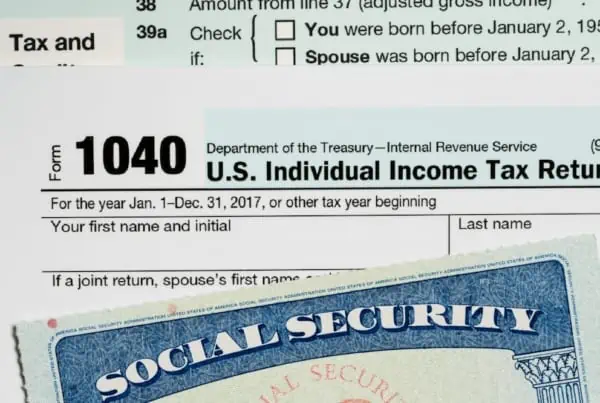Although we’ll be working for a few more years, my wife and I have started looking for a retirement home in a new location. Something near the beach or a lake would be nice. Not too far from family and friends, too.
Of course, as a tax writer, I’m also looking for a state with low income tax rates, a modest sales tax, and reasonable property taxes. But another important goal is to avoid states that tax Social Security benefits if at all possible.
The federal government is going to tax up to 85% of our Social Security benefits when we retire, but my wife and I don’t want to pay state taxes on this retirement income, too. So, while we’re not necessarily crossing states that tax Social Security income completely off our list of possible retirement locations, those states certainly have a strike against them.
If you’re in the same boat, check out my list of states that tax Social Security benefits. It includes states that only tax part of your Social Security payments or only taxes certain residents. I’ll also provide some other state tax information that might be helpful as you look for your own retirement dream home.
(Sales tax rates are provided by the Tax Foundation. Median property tax rates are based on 2022 data from the U.S. Census Bureau, which is the most recent data available.)
Related: 11 Ways to Avoid Taxes on Social Security Benefits
Colorado Taxes on Social Security Benefits

When it comes to taxes on Social Security benefits, Colorado is a good place to retire … as long as you don’t retire early. That’s because the Centennial State’s tax on Social Security income only applies if you’re 55 to 64 years old.
If that’s the case, you can deduct up to $20,000 of Social Security income that’s taxed at the federal level. Anything above that amount is subject to Colorado income taxes.
If you’re 65 or older, there’s no Colorado tax on your benefits.
Other Colorado State Taxes
Personal Income Tax Rates—Colorado has a flat state income tax rate of 4.4%.
Income Tax on IRA and 401(k) Plan Withdrawals—If you’re at least 65 years old, you can deduct up to $24,000 of 401(k) or IRA distributions that are taxed at the federal level. If you’re between 55 and 64 years old, you can deduct up to $20,000.
Sales Taxes—Colorado’s statewide sales tax rate is a relatively low 2.9%, but local government rates can be as high as 8.3%. As a result, according to the Tax Foundation, the average combined state and local sales tax rate in Colorado is 7.81%, which is the 16th-highest in the U.S.
Property Taxes—From a statewide perspective, property tax bills are relatively low in Colorado. The median property tax rate for the entire state is only 0.45%, which is the fourth-lowest when compared to the median rates in all 50 states and the District of Columbia.
Estate and Inheritance Taxes—If you live in Colorado, your heirs will be happy to know that there are no state estate or inheritance taxes.
Related: Can I Retire at 60 with $500K? [YES! See Examples of How]
Connecticut Taxes on Social Security Benefits

My wife and I used to live in Connecticut, so it makes me sad to put the state on this list. But I don’t think we’ll be returning to the Nutmeg State in our golden years, in part because we don’t want to risk having to pay the state’s tax on Social Security income. (Although, as outlined below, Connecticut is cutting income taxes on other types of retirement income starting this year.)
There is some good news for Social Security recipients: You won’t have to pay the Connecticut tax on your benefits if your federal adjusted gross income for the year is below:
- $75,000 if you’re single or a married person filing a separate tax return
- $100,000 if you’re married filing jointly, a head-of-household filer, or a surviving spouse
However, if your income is above the applicable threshold, the state will tax 25% of either your total Social Security income for the year or your Social Security benefits subject to tax at the federal level, whichever is lower.
Other Connecticut State Taxes
Personal Income Tax Rates—Connecticut state income tax rates start at 2% and go up to 6.99%.
Income Tax on IRA and 401(k) Plan Withdrawals—For 2024 and 2025, distributions from a 401(k) account are fully exempt if your federal adjusted gross income is less than:
- $75,000 for single filers, married people filing a separate tax return, or head-of-household filers
- $100,000 for married couples filing jointly
People with income below the $75,000/$100,000 threshold can also deduct 50% of any withdrawals from a traditional IRA in 2024.
A partial exemption (ranging from 2.5% to 85%) for IRA and 401(k) payments is available if your income is between:
- $75,000 and $99,999 for single filers, married people filing a separate tax return, or head-of-household filers
- $100,000 and $149,999 for married couples filing jointly
Going forward, the base deduction for IRA distributions jumps to 75% in 2025, and then to 100% in 2026 and thereafter.
Sales Taxes—Connecticut imposes a 6.35% sales tax. No local sales taxes are permitted, so the combined state and local sales tax rate is 6.35%, which is the 19th-lowest in the nation.
Property Taxes—Plan for a big property tax bill if you move to Connecticut. The median property tax rate in Connecticut is 1.78%, which is the third-highest in the country.
Estate and Inheritance Taxes—Connecticut imposes a 12% estate tax, but for 2024 it only applies to estates worth $13.61 million or more ($13.99 million in 2025).
Do you want to get serious about saving and planning for retirement? Sign up for Retire With Riley, Young and the Invested’s free retirement planning newsletter.
Related: How to Use Your HSA for Retirement
Minnesota Taxes on Social Security Benefits

The taxation of Social Security payments is a bit more complicated in the North Star State. That’s because there are two separate ways to calculate the Minnesota tax on your benefits. However, for many Minnesota retirees, there’s no state income tax on their Social Security income.
When calculating your Minnesota taxable income, include the amount (if any) of Social Security benefits taxed at the federal level. From that point, you can claim a tax deduction for Social Security income under one of two methods—pick the one that saves you the most money.
Under the “simplified method,” you can deduct 100% of your Social Security benefits on your Minnesota income tax return if your federal adjusted gross income is below a certain amount. However, if your federal adjusted gross income is above the applicable threshold, your deduction is phased out by 10% for each $4,000 of income over the threshold amount (10% for each $2,000 over the threshold for married taxpayers filing separate returns).
The federal adjusted gross income thresholds and phaseout ranges for the 2024 tax year are shown in the following table.
| Filing Status | Provisional Income | Maximum Deduction |
|---|---|---|
| Married Filing Jointly or Surviving Spouse | $105,380 or less | Social Security benefits taxed at federal level |
| $105,381 to $145,380 | Social Security benefits taxed at federal level minus 10% for each $4,000 of AGI above $105,380 | |
| $145,381 or more | $0 | |
| Single or Head of Household | $82,190 or less | Social Security benefits taxed at federal level |
| $82,191 to $122,190 | Social Security benefits taxed at federal level minus 10% for each $4,000 of AGI above $82,190 | |
| $122,191 or more | $0 | |
| Married Filing Separately | $52,690 or less | Social Security benefits taxed at federal level |
| $52,691 to $72,690 | Social Security benefits taxed at federal level minus 10% for each $2,000 of AGI above $52,690 | |
| $72,691 or more | $0 |
Under the “alternative method,” you can deduct Social Security benefits on your Minnesota tax return according to the following table.
| Filing Status | Provisional Income | Maximum Deduction |
|---|---|---|
| Married Filing Jointly or Surviving Spouse | $88,630 or less | $5,840 |
| $88,631 to $117,830 | $5,840 minus 20% of provisional income over $88,630 | |
| $117,831 or more | $0 | |
| Single or Head of Household | $69,250 or less | $4,560 |
| $69,251 to $92,050 | $4,560 minus 20% of provisional income over $69,250 | |
| $92,051 or more | $0 | |
| Married Filing Separately | $44,315 or less | $2,920 |
| $44,316 to $58,915 | $2,920 minus 20% of provisional income over $44,315 | |
| $58,916 or more | $0 |
For this deduction, “provisional income” is equal to modified adjusted gross income, as used for purposes of calculating federal taxes on Social Security benefits, plus one-half of the Social Security benefits taxed at the federal level for the year.
Other Minnesota State Taxes
Personal Income Tax Rates—The lowest Minnesota income tax rate is 5.35%. The highest rate is a comparatively high 9.85%.
Income Tax on IRA and 401(k) Plan Withdrawals—There are no special tax breaks under Minnesota law for withdrawals from an IRA or 401(k) account. As a result, they’re taxed by Minnesota to the same extent they’re taxed under federal law.
YATI Tip: While there’s no special tax break for IRA or 401(k) distributions, seniors age 65 or older can claim a special deduction of up to $9,600 ($12,000 for joint filers). Income limits apply.
Sales Taxes—Minnesota sales taxes are on the high side. There’s a 6.875% state tax, plus local taxes of up to 2.15%. The average combined state and local sales tax rate for Minnesota is 8.038%, which is the 15th-highest in the U.S.
Property Taxes—At 0.98%, Minnesota’s median property tax rate is a little on the high end. That comes in as the 19th-highest amount among all 50 states and the District of Columbia.
Estate and Inheritance Taxes—Minnesota taxes estates valued at $3 million or more. The estate tax rates range from 13% to 16%.
Related: Retirement Saver’s Tax Credit: What Is It, How Much, Who’s Eligible + More
Montana Taxes on Social Security Benefits

While a house with a view near Flathead Lake sounds nice for a retirement destination, you might have to pay the Montana tax on Social Security benefits if you moved out to Big Sky country.
Before 2024, the calculation of Montana taxes on Social Security income was based on your Montana adjusted gross income, not your federal adjusted gross income. As a result, the Montana tax didn’t always match up perfectly with the federal tax.
However, starting last year, Montana taxpayers won’t have to calculate Montana adjusted gross income anymore. Instead, the calculation of Montana income tax will be based on your federal adjusted gross income. Since there are no adjustments to that amount for Social Security benefits, the same amount of Social Security income subject to federal tax is also subject to Montana tax for the 2024 tax year.
Other Montana State Taxes
Personal Income Tax Rates—There are only two Montana tax rates: 4.7% and 5.9%.
Income Tax on IRA and 401(k) Plan Withdrawals—Beginning with the 2024 tax year, the former deduction for pension and other retirement income (including IRA and 401(k) distributions) is repealed and replaced with a new $5,500 deduction for each Montana taxpayer who is at least 65 years old.
Sales Taxes—There’s no state-level sales tax in Montana. Plus, local governments generally can’t impose their own sales tax, either. However, a few tourist areas (e.g., Whitefish, Big Sky, and West Yellowstone) can impose a “resort tax” of up to 3%.
Property Taxes—Property tax bills are generally on the low side in Montana, too. The state’s median property tax rate is 0.68%, which is the nation’s 19th-lowest rate.
Estate and Inheritance Taxes—Montana does not collect estate or inheritance taxes.
Related: What Tax Bracket Are You In?
New Mexico Taxes on Social Security Benefits

If you’re a retiree in New Mexico, you won’t owe tax on your Social Security benefits if your adjusted gross income is:
- $150,000 or less if your filing status is married filing jointly, head of household, or qualified widow(er)
- $100,000 or less if your filing status is single
- $75,000 or less if your filing status is married filing separately
However, if you exceed the applicable income threshold, your Social Security income is subject to New Mexico taxes to the same extent it’s subject to federal income taxes.
Other New Mexico State Taxes
Personal Income Tax Rates—State income tax rates in New Mexico start at 1.7% and rise to 5.9%.
Income Tax on IRA and 401(k) Plan Withdrawals—If you’re at least 65 years old, you can deduct up to $8,000 of income—including IRA and 401(k) withdrawals—on your New Mexico tax return.
YATI Tip: If you’re at least 100 years old, all your income is exempt from New Mexico taxes.
Sales Taxes—The state sales tax rate in New Mexico is 4.875%, but some local governments tack on an additional 4.06%. According to the Tax Foundation, this results in an average combined state and local sales tax rate of 7.617%, which is the 17th-highest rate in the country.
Property Taxes—The median property tax rate in New Mexico is only 0.67%, which is the 17th-lowest in the country.
Estate and Inheritance Taxes—Estate planning is easier in New Mexico, since the state has no estate or inheritance tax.
Do you want to get serious about saving and planning for retirement? Sign up for Retire With Riley, Young and the Invested’s free retirement planning newsletter.
Related: What Are Spousal Benefits [And How Do They Work?]
Rhode Island Taxes on Social Security Benefits

You won’t owe Rhode Island taxes on your Social Security benefits if your federal adjusted gross income is below a certain amount. The Rhode Island Department of Revenue released the 2024 income thresholds:
- $130,250 for married couples filing jointly or qualifying widow(er)s
- $104,225 for married taxpayers filing separately
- $104,200 for single and head-of-household filers
However, if you exceed the applicable income threshold, the Ocean State will tax your Social Security payments to the same extent they’re taxed by the federal government.
Other Rhode Island State Taxes
Personal Income Tax Rates—The lowest tax rate in Rhode Island is 3.75%, while the highest rate is 5.99%.
Income Tax on IRA and 401(k) Plan Withdrawals—If you’ve reached your full retirement age (as defined by the Social Security Administration) and don’t exceed certain income thresholds, you can deduct up to $20,000 of 401(k) distributions and other common forms of retirement income (but not IRA withdrawals) from your Rhode Island taxable income.
The 2024 thresholds are the same for the Social Security income deduction (i.e., $130,250, $104,225, or $104,200).
Sales Taxes—The Rhode Island sales tax is very average. There’s a 7% state sales tax, but there’s no local sales tax in the state. With a combined state and local rate of 7%, Rhode Island claims the 25th-highest rate in the nation (like I said, very average).
Property Taxes—Like other states in the northeast, Rhode Island has higher-than-average property tax rates. The state’s median property tax rate is 1.23%, which is 14th-highest in the U.S.
Estate and Inheritance Taxes—Rhode Island imposes an estate tax. The rates run from 0.8% to 16%, but for 2024 the tax only applies to estates worth $1,774,583 or more.
Related: When Should You Take Social Security?
Utah Taxes on Social Security Benefits

Utah has a unique way of handling its tax on Social Security income. Instead of a tax deduction or exemption, the Beehive State uses a tax credit to reduce or eliminate the state tax on Social Security recipients. But there are income limits restricting who can claim the full tax credit, so some higher-income residents end up paying state income tax on at least some of their Social Security payments.
The full tax credit is equal to the amount of Social Security benefits taxed on the federal level multiplied by the Utah income tax rate (4.65%). However, the credit is reduced if your Utah modified adjusted gross income is above the following applicable amount:
- $37,500 for a married person filing a separate tax return
- $45,000 for single filers
- $75,000 for married couples filing jointly, head-of-household filers, and surviving spouses
Your tax credit is reduced by $0.025 for every dollar over the applicable income threshold.
Other Utah State Taxes
Personal Income Tax Rates—Utah has a flat state income tax rate of 4.65%.
Income Tax on IRA and 401(k) Plan Withdrawals—There’s a very narrow tax deduction for distributions from a traditional 401(k) plan, but it only applies if, at the time the money was put into the account, the withdrawn funds were taxed by another state, the District of Columbia, or a U.S. possession. Otherwise, there are no other Utah tax breaks for IRA or 401(k) distributions.
YATI Tip: People born before 1953 qualify for a Utah tax credit of up to $450 if they don’t claim either the credit for Social Security benefits or for military retirement income.
Sales Taxes—Sales taxes are a little on the high side in Utah. There’s a 4.85% state sales tax, 1.25% in mandatory local taxes, and additional local taxes of up to 4.2%. According to the Tax Foundation, this results in an average combined state and local sales tax rate of 7.249%, which is the country’s 20th-highest rate.
Property Taxes—Property taxes are on the low side, though. Utah’s median property tax rate is only 0.48%, which is 8th-lowest rate in the nation.
Estate and Inheritance Taxes—Another plus is that there are no estate or inheritance taxes in Utah.
Related: How to Roll Over 401(k) Accounts [Which Option Is Best?]
Vermont Taxes on Social Security Benefits

In Vermont, the state won’t tax Social Security benefits if your federal adjusted gross income is:
- $65,000 or less for married couples filing a joint tax return
- $50,000 or less for everyone else
If your income is above the applicable amount, you might qualify for a partial tax exemption if your federal adjusted gross income is between:
- $65,001 and $74,999 for joint filers
- $50,001 and $59,999 for other people
If your income exceeds the income thresholds for a partial tax break, then Vermont taxes your Social Security benefits to the same extent they’re taxed under federal law.
Other Vermont State Taxes
Personal Income Tax Rates—Vermont’s state income tax rates start at 3.35% and run as high as 8.75%.
Income Tax on IRA and 401(k) Plan Withdrawals—Since there are no special tax breaks for IRA or 401(k) plan distributions, withdrawals from those types of retirement accounts are taxed by Vermont to the same extent they’re taxed under the federal income tax law.
Sales Taxes—Vermont sales taxes are a little below average. The state imposes a 6% tax, while local governments can add an additional 1% tax. All in all, the average combined state and local sales tax rate in Vermont is 6.359%. That’s the 20th-lowest rate in the country.
Property Taxes—Vermont property taxes, on the other hand, are well above the national average. At 1.57%, the state has the fifth-highest median property tax rate in the nation.
Estate and Inheritance Taxes—Vermont also taxes estates worth $5 million or more at a 16% rate.
Related: How to Maximize Social Security Spousal Benefits
West Virginia Taxes on Social Security Benefits

I’ve left West Virginia for last as it’s tax on Social Security benefits is officially set to sunset by the end of 2025 and not exist from 2026 onward. The law phasing out the tax passed in March 2024.
Current law has West Virginia still subject your Social Security to taxation if you fall into certain income levels. Specifically, West Virginia will tax your Social Security benefits if your federal adjusted gross income is:
- More than $100,000 for married couples filing jointly
- More than $50,000 for all other taxpayers
If your income is greater than the applicable dollar amount, West Virginia will levy a state income tax on your Social Security payments to the same extent you must pay taxes on that income to the federal government.
Other West Virginia State Taxes
Personal Income Tax Rates—West Virginia state income tax rates range from 2.36% to 5.12%. However, beginning in 2025, the rates can be lowered each year if certain revenue collection thresholds are exceeded, but no more than 10% per year.
Income Tax on IRA and 401(k) Plan Withdrawals—West Virginia taxes IRA and 401(k) distributions to the same extent they’re taxed at the federal level.
YATI Tip: If you’re at least 65 years old, you can automatically deduct up to $8,000 from your West Virginia taxable income.
Sales Taxes—West Virginia imposes a 6% state-level sales tax, while local governments can tack on an additional 1%. According to the Tax Foundation, the average combined state and local sales tax rate in West Virginia is 6.567%, which is the 21st-lowest in the country.
Property Taxes—The median property tax rate in West Virginia is only 0.53%, which is the 11th-lowest in the U.S.
Estate and Inheritance Taxes—Residents of West Virginia don’t have to worry about a state-level estate or inheritance tax.
Do you want to get serious about saving and planning for retirement? Sign up for Retire With Riley, Young and the Invested’s free retirement planning newsletter.
Related:








